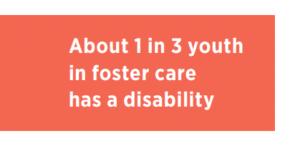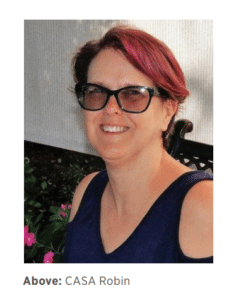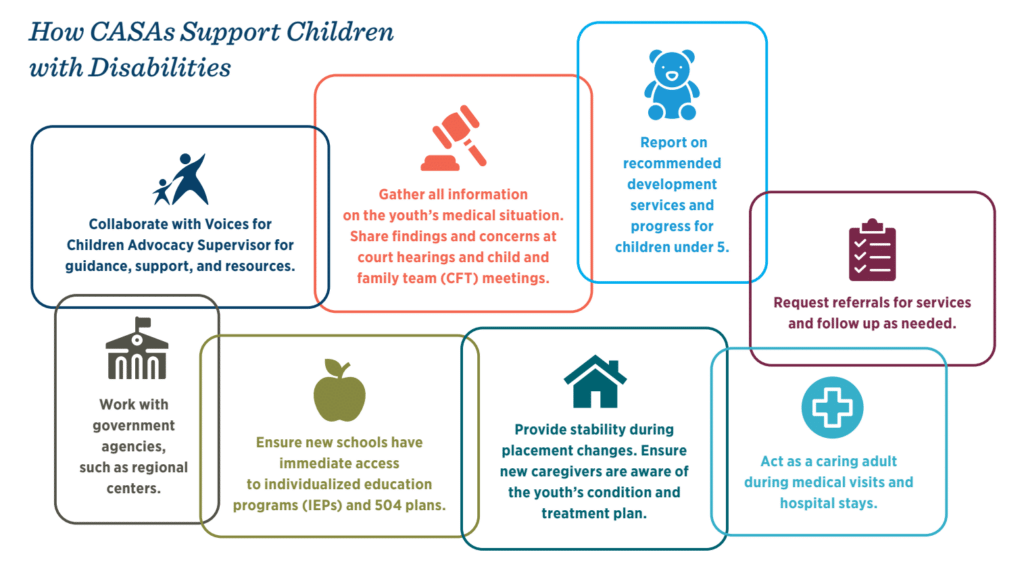Fostering Hope
Youth with disabilities fare worse than their peers in foster care, but CASAs can fill in the gaps and advocate for crucial services.
In a lot of ways, 12-year-old “Grant” is just like any seventh-grade boy. He loves robotics, playing video games, and even dreams of being a professional gamer on YouTube. But Grant has a neuromuscular disease. He uses a wheelchair, needs help using the restroom, and can’t participate in many of the same activities as his peers. On top of everything, Grant has spent the last two years in foster care.
A Different Foster Care Experience
Grant isn’t alone. An estimated 32 percent of youth in foster care have a physical or intellectual disability, double that of the general population. There are several reasons why. Children with disabilities are three to four times more likely to suffer abuse and neglect. If they have difficulty communicating, they are even more likely to become victims because abusers see them as easy targets. Further, parents of children with disabilities experience more stress, and some have a hard time taking appropriate care of their children. Grant came into foster care because of neglect and reports of substance abuse at home. His family wasn’t meeting his needs; he repeatedly missed school and vital medical appointments necessary for his health and well-being.
Once they enter the child welfare system, these children often face more trauma and worse outcomes than other youth in foster care:
• On average, children with disabilities stay in foster care longer.
• Their parents are more likely to have their parental rights terminated.
• Children with disabilities are 40 percent less likely to be placed with relatives in kinship care.
• They wait longer to be adopted.
 Fortunately, Court Appointed Special Advocates (CASAs) can help ensure youth with disabilities don’t fall through the cracks and help them lead happier, healthier lives. When Riverside County CASA Robin was offered Grant’s case, she admits she was hesitant. Since becoming a volunteer in 2018, she had advocated for several youth in foster care, but never one with a physical disability. After some reflection, CASA Robin accepted and immersed herself in the case, learning everything she could about Grant’s condition.
Fortunately, Court Appointed Special Advocates (CASAs) can help ensure youth with disabilities don’t fall through the cracks and help them lead happier, healthier lives. When Riverside County CASA Robin was offered Grant’s case, she admits she was hesitant. Since becoming a volunteer in 2018, she had advocated for several youth in foster care, but never one with a physical disability. After some reflection, CASA Robin accepted and immersed herself in the case, learning everything she could about Grant’s condition.
 A CASA’s Role
A CASA’s Role
No matter the child, a CASA’s job is the same: to ensure their physical, emotional, medical, and educational needs are met. However, CASAs who advocate for youth with special needs face unique challenges, such as understanding complex medical diagnoses and cutting through red tape in the healthcare system. They may have a tough time communicating with or visiting their case youth.
“Sometimes, the child’s caregiver is inundated with appointments and other professionals, so it can be hard coordinating schedules to get access,” said Megan Marashlian, Director of Advocacy for Voices for Children’s (VFC) San Diego County program.
“With so many people involved in a case, it can be challenging to know whom to go to for what,” she added.
As Grant’s advocate, CASA Robin has a lot to monitor. For instance, she has to make sure he attends physical therapy and his annual cardiology appointment, in addition to the yearly check-up and twice-a-year dental visits required for all children.
“I’ve been in contact with the school more than I would in other cases to make sure he’s in the best situation,” CASA Robin said.
CASA Robin also has special considerations when planning outings with Grant. Locations must be wheelchair accessible, and activities can’t too frustrating or strenuous. CASA Robin often brings paint and canvases to Grant’s foster home where they’ll chat about his life while creating art. Gradually, she noticed Grant go from depressed and disruptive to bright and hopeful.
 Support for CASAs
Support for CASAs
VFC trains and supports all volunteers, including those assigned to youth with disabilities, so they feel confident in their role. Each CASA is assigned their own dedicated Advocacy Supervisor, a staff member at VFC with expert knowledge of the court system, the foster care system, and the resources available to youth in foster care.
“You don’t have to be afraid of taking on a case because you aren’t going to be doing it alone,” CASA Robin explained. “Anytime I have a question, the first thing I do is contact my supervisor.”
VFC also provides continuing education for CASAs and staff to better understand disabilities and the resources available. Recent topics included Medical Disabilities and Psychotropic Medication, Disability Rights and Resources, and Special Education.
“Every kid is just wanting someone to care about them.” — CASA ROBIN
A Brighter Future
Today, Grant has a new outlook on life. He is thriving in a supportive foster home with a retired nurse equipped to meet his needs. His principal and teachers say he’s interacting more with other students. Also, CASA Robin is receiving fewer phone calls about disruptive behavior. Next fall, Grant will start the new school year requiring fewer special education services than ever. With a supportive foster parent and CASA by his side, Grant finally sees a future for himself. “Every kid is just wanting someone to care about them,” CASA Robin said.
*SOURCES:
Slayter, Elspeth (2016). “Youth with disabilities in the United States child welfare system.” Children and Youth Services Review. 64: 155–165.
Zablotsky, Benjamin, Lindsey I. Black, Matthew J. Maenner, Laura A. Schieve, Melissa L. Danielson, Rebecca H. Bitsko, Stephen J. Blumberg, Michael D. Kogan, Coleen A. Boyle (2019). “Prevalence and Trends of Developmental Disabilities among Children in the United States: 2009–2017.” Pediatrics. 144(4): e20190811. doi: 10.1542/peds.2019–0811.
Jaudes, Paula Kienberger & Mackey-Bilaver, Lucy (2008). “Do Chronic Conditions Increase Young Children’s Risk of Being Maltreated?”. Child Abuse & Neglect. 32 (7):
671–681.
Kay, Joshua (2019). “Advocating for Children with Disabilities in Child Protection Cases.” Touro Law Review. 35(1): 345–66.
Hsiao, Y.-J. (2018). “Parental Stress in Families of Children With Disabilities.” Intervention in School and Clinic. 53(4): 201–205.